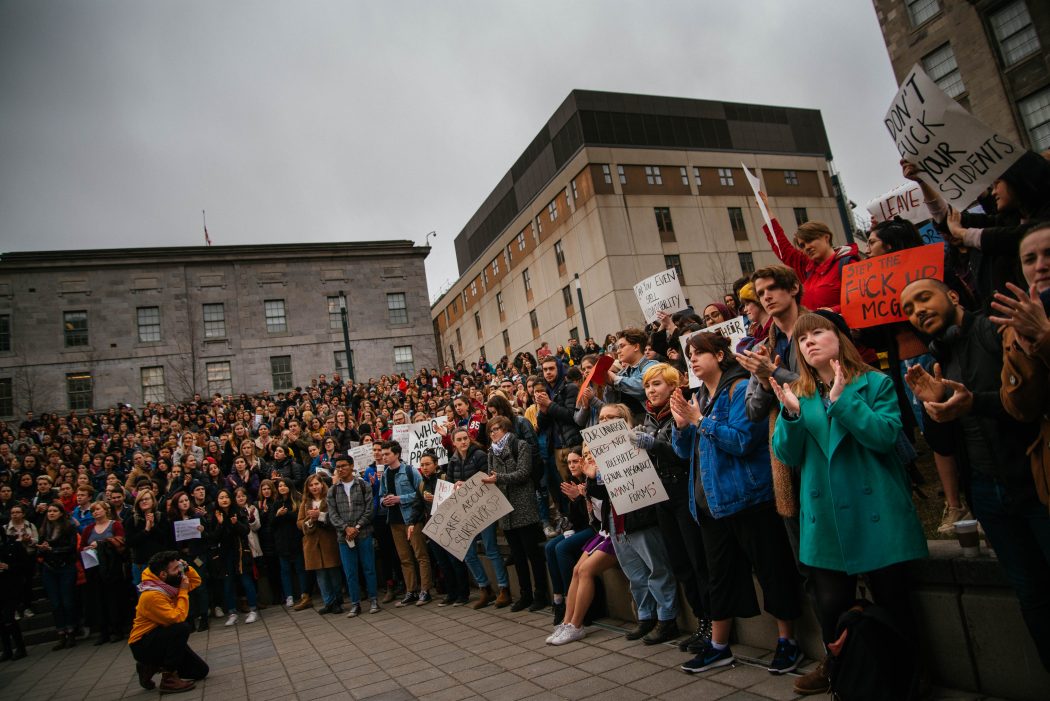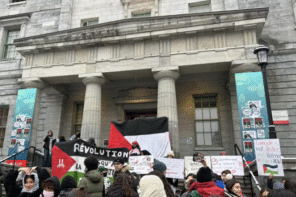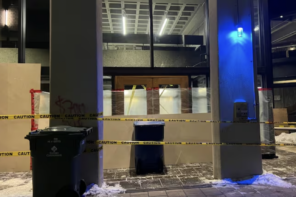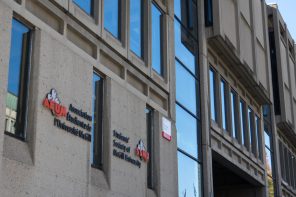On April 11, McGill and Concordia students participated in an organized walkout that protested the current process by which the administration handles complaints of sexual misconduct against professors.
The crowd filled the entirety of the steps in Community Square, creating a loud presence directly adjacent to the administration building. Many protesters held signs, and the crowd cheered in support as a diverse array of McGill and Concordia students came forward to address the group. Students took the microphone to share their experiences and directly called for action to be taken against allowing alleged “predatory professors” to remain on campus.
We have a responsibility to recognize when we are not being treated fairly.
Walkout organizers specifically invited Indigenous and gender non-conforming persons, as well as women of colour, to speak at the microphone to share their thoughts and experiences, stressing the necessity of uplifting historically marginalized voices.
One student was Morenike Fashola, a third-year McGill student and Floor Fellow. Fashola expressed that the protest was an obligation. “We have a responsibility to recognize when we are not being treated fairly,” Fashola said.
The walkout was orchestrated by the Students’ Society of McGill University (SSMU) External Affairs and the Concordia Student Union (CSU). The protest came in the wake of an open letter that was released on April 4. In the letter, the SSMU called for a formal external investigation into the process for handling complaints against faculty members, specifically within the Office of the Dean of Arts.
The document directly addresses McGill Principal Suzanne Fortier, Provost Christopher Manfredi, and Dean of Students Chris Buddle, and is signed by the six current members of the SSMU executive. As of April 11, the online letter contained endorsements from 86 McGill student associations, as well as over 2000 individual student signatures.
On April 5, the SSMU held a press conference, with representatives from the SSMU, the Arts Undergraduate Society (AUS), and The Sexual Assault Centre of the McGill Students’ Society (SACOMSS). Representatives from these student organizations spoke to express their frustration with the current processes in place for handling allegations of sexual misconduct, including sexual violence.
Concordia University students participated in the April 11 walkout alongside McGill students. Concordia students are currently undertaking a similar student movement against alleged mismanagement of sexual misconduct claims directed at faculty members. The CSU is currently working to try to include recommendations from the Our Turn report in Concordia’s official policy against sexual violence. Support for the movement is growing at Concordia after recent allegations of sexual misconduct against faculty members in the Creative Writing department.
Before the walkout, on April 10, McGill Provost Christopher Manfredi released an email to McGill students and staff, stating, “Our University does not tolerate sexual misconduct in any form.” While his message re-iterated the administration’s current policy, one of the organizers of the walkout, and current SSMU Vice President External Connor Spencer, reiterated to the crowd on April 11 that this protest movement is demanding more than change to the current policy.
As proven by the sheer amount of people here today – we take this very seriously, and they should, too.
Calling for timely and concrete action to be taken, Spencer announced at the walkout that the group is prepared to bring this issue to a higher level. Directly addressing the McGill administration, Spencer stated: “If you do not, by Monday [April 16], acknowledge that there is a problem with the existing policy and procedures, and admit to launching an external investigation into the Office of the Dean of Arts, we will be reporting you to the Minister of Higher Education’s office.”
Spencer made it very clear in her speech that she was unimpressed with Manfredi’s message from the previous day, and from the administration’s response to the issue in general. “We demand an acknowledgement of the severity and the pervasiveness of the issue,” Spencer asserted. “As proven by the sheer amount of people here today – we take this very seriously, and they should, too.”








